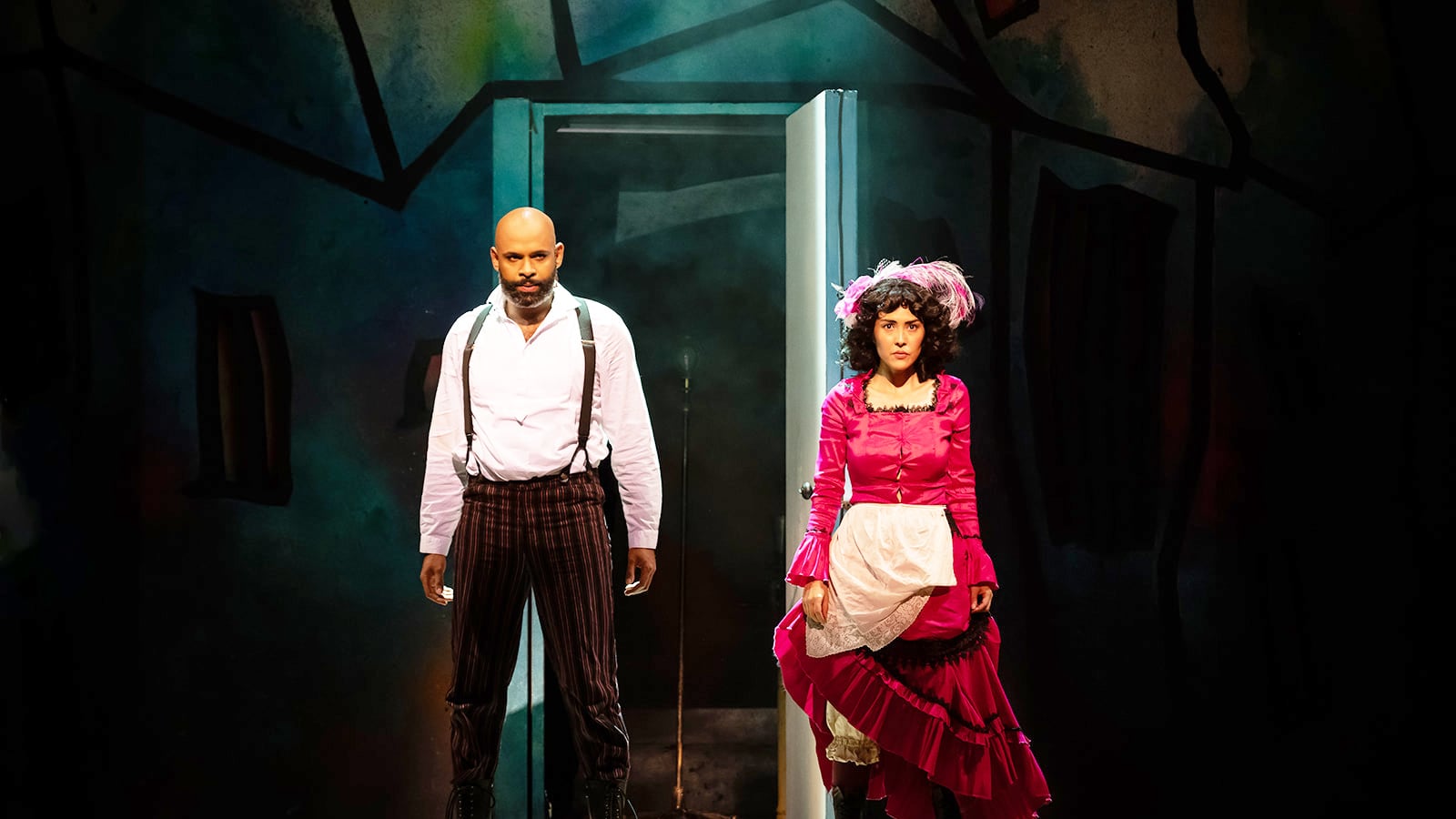On a recent episode of Hulu’s Only Murders in the Building, the theatrical Oliver Putnam (Martin Short) has to help Zach Galifianakis get in character to play an in-universe version of Putnam. He asks Galifianakis, “Who is the definitive Mrs. Lovett: Lansbury or LuPone?” Oliver takes offense when Galifianakis guesses LuPone.
For Portland Center Stage director Chip Miller’s part, Oliver has it right. Seeing a PBS broadcast of Angela Lansbury’s Broadway-originating performance as a young child made this Stephen Sondheim musical a lifelong favorite of Miller’s.
PCS began its 2024-25 season with Sondheim’s Sweeney Todd. Opening night on Friday, Oct. 4, saw Ashley Song offering her own vibrant take on Mrs. Lovett, baker of “the worst pies in London.” Song had initially been cast in the ensemble, but took over from DJ Curtis Jr.; swing player Princess Kannah took Song’s place in the ensemble. Song acquitted herself quite well, portraying Mrs. Lovett’s lack of care for social niceties, her frantic scrambles to cover up unpleasant truths behind her schemes, and especially her tender revelations of her own dearest wishes.
Humble Pie Baking Company, based in Tigard, vended personal-sized treats, both fruit pies and English pasties with beef and vegetables, in the lobby. In keeping with PCS tradition, the bar served cocktails and mocktails named for the play’s lyrics, all using raspberry as a key color ingredient.
On the subject of color, the stage is a real riot. Unlike most creative visions of 19th century London, PCS’s Sweeney Todd set is a building splashed (through lighting) with wild hues. The roofline and windows twist into bizarre shapes, giving the impression of a rainbow fire. Combined with the organ-centric orchestration and the elaborately revolving layers of the set—depicting Mrs. Lovett’s pie shop, Sweeney’s barbershop, and Fleet Street—it’s a borderline psychedelic haunted house.
Miguel Ángel Vásquez stood out as the Demon Barber of Fleet Street with his contrasting bald head and full beard, striking dark red leather overcoat, and operatic baritone. Wildlin Pierrevil played the young sailor Anthony with a dark romanticism that came across whether he projected his lyrics loudly or sang in a whisper. On the villains’ side, actors Leif Norby and Isaac Lamb, old friends in real life, respectively play the hypocritically hypermoral Judge Turpin and his devoted officer, Beadle Bamford. Both are simultaneously campy yet intimidating, but particularly Lamb with his high voice, large stature and ever-present nightstick. Though Bamford is not the most privileged character in the narrative, he represents Judge Turpin’s ruling-class interests and lends much nuance behind the story’s morbid comedy and escalating tragedy. This nuance interacts interestingly with the play’s color-conscious casting in some key scenes.
Bamford and a beat cop, both played by white actors, attempt to subdue Anthony, who is played by a Black actor. When Anthony successfully breaks free from his attackers, the audience may have applauded harder for Black people abused by the judicial system who weren’t as lucky as Anthony. Meanwhile, a scene in which the beadle visits Mrs. Lovett to investigate complaints about odors from her oven took on a new meaning with an Asian actor playing Mrs. Lovett, calling to mind the controversial closure of Pho Gabo in Northeast Portland in February.
Mrs. Lovett is by no means an innocent restaurateur, but PCS’s casting uncomfortably mirrors persistent class divisions in society, and the darkness to which Sweeney and Mrs. Lovett descend to avenge themselves against a world that has failed them. It takes a merrily macabre sense of humor to temper that darkness, with perhaps no greater example than the song ”A Little Priest,” in which Sweeney and Mrs. Lovett sing about how priests and poets and politicians might taste. “Those above will serve those below,” indeed.
As recently as 2020, Portland Center Stage, among other local theater companies, had a reputation for failing to address the concerns of BIPOC creatives. But this production is only the latest during the tenure of both Miller and PCS artistic director Marissa Wolf to employ color-conscious casting. As Miller said in an interview for the play’s program, “Anyone can be in this world.” This world is an iconic one, but under Miller’s direction, it takes on new and important meaning to meet this moment in time.
SEE IT: Sweeney Todd: The Demon Barber of Fleet Street at Portland Center Stage, 128 NW 11th Ave., 503-445-3700, pcs.org. 7:30 pm Wednesday–Friday, 2 and 7:30 pm Saturday–Sunday, through Nov. 3. $25–$93.

